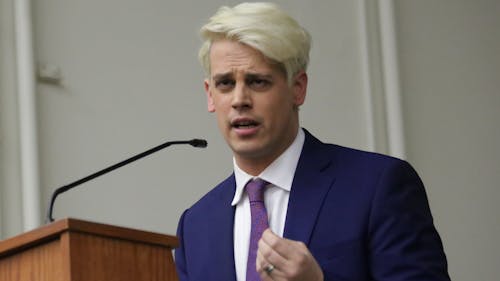ICYMI: Milo Yiannopoulos speaks at Rutgers, students protest

Controversy gripped when conservative writer Milo Yiannopoulos’s “Dangerous Faggot Tour” kicked off last February.
The self-described firebrand delivered his contention to 450 students, roughly 50 of which were there in an extremely vocal protest.
They said Yiannopoulos represented hate.
One protester said speakers like Yiannopoulos, who might make some students feel uncomfortable, should not be invited.
“(Rutgers groups) should not be inviting anyone like (Yiannopoulos) because what we stand for is inclusion and diversity … If a speaker makes someone feel unsafe or uncomfortable, then they should not come to campus,” said Nyuma Waggeh, a School of Arts and Sciences junior.
Most of the students in attendance took issue with the protesters’ methods. Both groups engaged in shouting matches that disrupted much of the event.
In an interview a day before the event, Yiannopoulos told The Daily Targum that he expected such a response.
“These people do not believe in the free open exchange of ideas. They do not believe in intellectual inquiry, in full open frank discussion of ideas,” he said. “They don't believe in the basis of classical liberalism, which is one of the founding principles of our civilization.”
In one of many student commentaries submitted to The Daily Targum, School of Engineering first-year student Aviv Khavich, who was one of the Young Americans for Liberty members that invited Yiannopolous to Rutgers, defended the Breitbart tech editor’s right to speak.
The group violated no laws or University policies by bringing Yiannopoulos to Rutgers. Khavich said preventing the British journalist from speaking would be censorship.
“There can be time, place and manner restrictions on speech, but the courts have ruled that unless a viable alternative is provided, it is still censorship,” Khavich writes in his commentary. “The right to free speech is arguably one of the most important human rights in the world. We should be looking for ways to reduce the limits on free speech, not increase them.”
The controversy spurred by the event was so far-reaching that Rutgers' top-level administrators were forced to step in.
University President Robert L. Barchi released a message reaffirming the University’s commitment to free speech and academic freedom to the Rutgers community in early March.
“While I will not defend the content of every opinion expressed by every member of our academic community, or of speakers who we invite to our campus, I will defend their right to speak freely," Barchi said. "That freedom is fundamental to our University, our society and our nation."
This article is part of our Spring 2016 Perspectives edition. Find the full issue here.
Nikita Biryukov is a School of Arts and Sciences junior majoring in journalism and media studies. He is an associate news editor for The Daily Targum. Follow him on Twitter @nikitabiryukov_ for more.



